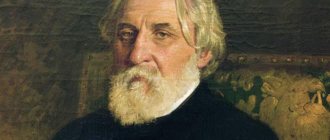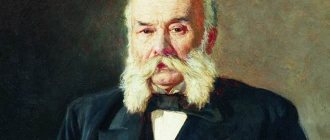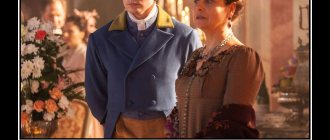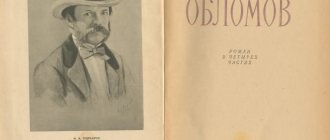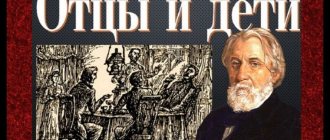Article menu:
- Family and origin of Andrei Stolts
- Education and upbringing of Andrei Stolts
- Appearance of Andrey Stolts
- Personality characteristics
- Ilya Oblomov and Andrey Stolts
- Andrey Stolts and Olga Ilyinskaya
Goncharov's novel Oblomov is primarily remembered for its hero Ilya Ilyich Oblomov, who leads an apathetic, inactive way of life. In contrast to the lazy Oblomov, his friend is depicted - Andrei Ivanovich Stolz - a man of humble origin, who, thanks to his hard work, is awarded a personal title of nobility.
Childhood
Origin
“...Stolz was only half German, according to his father: his mother was Russian;
He professed the Orthodox faith...” “...but still the son of a Russian noblewoman...”
Upbringing
“...From the age of eight, he sat with his father at the geographical map, sorted through the warehouses of Herder, Wieland, biblical verses and summed up the illiterate accounts of peasants, townspeople and factory workers, and with his mother he read the Sacred History, learned Krylov’s fables and sorted out the Telemak into warehouses "..."
“...his father made him a tutor in his small boarding school...”
“...he paid him a salary as a craftsman, completely in German: ten rubles a month, and forced him to sign a book...”
“...At the age of fourteen, fifteen, the boy often went alone, in a cart or on horseback, with a bag at the saddle, on errands from his father to the city, and it never happened that he forgot something, changed it, overlooked it, made a mistake...”
“...She didn’t quite like this laborious, practical upbringing. She was afraid that her son would become the same German burgher that his father came from...”
“It never happened that the boy forgot, overlooked, changed things up, made a mistake.”
“...Soon he began to read Telemak like she did, and play with her four hands...” (with his mother on the piano)
“...Mother always watched with concern as Andryusha disappeared from the house for half a day, and if only for his father’s positive prohibition to disturb him, she would have kept him near her..”
“...Have mercy, Ivan Bogdanich,” she complained, “not a day goes by without him returning without a blue spot, and the other day he broke his nose until it bled...”
“... it will not be a German university, there is no need for a Russian university to make a revolution in the life of his son...”
“...You are well educated: all careers are open to you; you can serve, trade, at least write, perhaps..."
Origin, upbringing, education
Stolz was German on his father's side, and his mother was a Russian noblewoman.
His father was the manager of an estate in the village of Verkhlevo and a teacher in the boarding school he established for noble children. His father instilled in Andrei an interest in science and taught him to practice. The mother taught her son to love books and music.
After finishing his studies at his father’s boarding school, Andrei entered the university. Trying to expand his horizons, he read not only educational publications, but also other books.
Andrei tried to get his friend, Ilya Oblomov, who was indifferent to his studies, to get carried away with something. Andrei supplied him with interesting books, but he did not read them very willingly. Despite the difference in character, Stolz valued his friendship with Oblomov, loved him for his kindness and pure soul.
After studying at the university, Andrei attended lectures at European universities.
Image
Appearance
“... Andryusha suddenly looked with his childish green eyes into three or four different spheres...”
“...the eyes, although a little greenish, are expressive...”
“...Stolz is the same age as Oblomov: and he is already over thirty years old...”
“...the complexion is even, darkish and no blush...”
“...He is all made up of bones, muscles and nerves, like a blooded English horse. He is thin, he has almost no cheeks at all, that is, he has bone and muscle, but no sign of fatty roundness...”
“...you’re not fat, you don’t have barley, the back of your head doesn’t itch. You are somehow built differently...”
“...he has nothing superfluous in his body...”
“...He had no idols, but he retained the strength of his soul, the strength of his body...”
“...He had no unnecessary movements. If he was sitting, he sat quietly, but if he acted, he used as many facial expressions as necessary...”
“...the role of the strong, which Stolz occupied under Oblomov, both physically and morally...”
Character
“...he exuded some kind of freshness and strength, before which even unshy women involuntarily felt embarrassed...”
“...his healthy body will not be able to resist if this strain of mind, will, and nerve continues for another month...”
“...And the more they challenged him, the more deeply he became entrenched in his stubbornness, even falling, at least in disputes, into Puritan fanaticism...”
“...Don’t, don’t talk,” Andrei objected, “I’ll go to him when I have a four-story house, and now I’ll do without him...”
“...No, you won’t sit in one place...” (Oblomov about Stolz)
“... His restraint from impulses, the ability not to go beyond the boundaries of the natural, free state of spirit...”
“...It seems that he controlled both sorrows and joys, like the movement of his hands, like the steps of his feet, or how he dealt with bad and good weather...”
“...He opened his umbrella while it was raining, that is, he suffered while the grief lasted, and he suffered without timid submission, but rather with annoyance, with pride, and endured it patiently...”
“...A simple, that is, direct, real view of life - that was his constant task...”
“...It’s tricky and difficult to live simply!..”
“...he attributed the cause of all suffering to himself, and did not hang it, like a caftan, on someone else’s nail...”
“...How you sometimes speak harshly about people, Andrei, God knows you...” (Oblomov to Stoltz)
“...Most of all he was afraid of imagination, this two-faced companion...”
“...He was afraid of every dream, or if he entered its area, he entered […] knowing the hour and minute when you would come out of there...”
“...The dream, the enigmatic, the mysterious had no place in his soul. What was not subject to analysis of experience, practical truth, was in his eyes an optical illusion..."
“...he was not able to arm himself with that courage that, closing his eyes, would jump across an abyss or throw himself at a wall at random. He will measure an abyss or a wall, and if there is no sure way to overcome, he will move away, no matter what they say about him ... "
“...in the moral activities of his life, he sought a balance between practical aspects and the subtle needs of the spirit. The two sides walked parallel, crossing and intertwining along the way, but never getting entangled in heavy, insoluble knots..."
“...He considered himself lucky because he could stay at the same height and, while riding on the skate of feeling, not overshoot the thin line separating the world of feeling from the world of lies and sentimentality, the world of truth from the world of the ridiculous...”
“... Even in the midst of his passion, he felt the ground under his feet and had enough strength in himself so that in case of emergency he could rush and be free...”
“...he was not consumed by the remorse of a weary heart; He didn’t feel sick in his soul, he never got lost in complex, difficult or new circumstances, but approached them as if he were former acquaintances, as if he were living a second time, passing through familiar places...”
“...Above all else he placed persistence in achieving goals: this was a sign of character in his eyes, and he never denied respect to people with this persistence, no matter how unimportant their goals were...”
“...he walked towards his goal, bravely walking through all obstacles, and only then abandoned the task when a wall appeared on his way or an impassable abyss opened up...”
“...and the book is someone else’s, Stolz’s, who has such a strict and boring order, especially about books, that God forbid! Papers, pencils, all the little things - just as you put them, just as they should be..."
Appearance
Andrei Ivanovich was the same age as his friend Ilya Oblomov. The author compares him to a thoroughbred English horse. It seemed that he was composed only of nerves and muscles. Stolz was thin. He lacked the “sign of fatty roundness”
.
On a dark face, green eyes looked very expressive. The gaze was sharp. Absolutely no detail escaped him. Ilya Oblomov enviously tells his friend that he exudes masculinity and health, because he “is not fat and does not have styes.”
- Comparative characteristics of Oblomov and Stolz in Goncharov’s novel “Oblomov”
Classes
“...I was abroad twice, after our wisdom, I humbly sat on the student benches in Bonn, in Jena, in Erlangen, then I learned Europe as my estate […] and Russia? I saw Russia up and down..."
“...Stolz was almost never in St. Petersburg...”
“...Wants to learn, see everything, know everything...”
“...trying to spend every day, like every ruble, with every minute, never dozing control of the spent time, labor, strength of soul and heart...”
“...he goes out into the world and reads: when he has time, God knows...”
“...he loved news, and light, and science, and all of life, but somehow deeper, more sincere...”
“...He said that “the normal purpose of a person is to live through the four seasons, that is, four ages, without leaps, and to carry the vessel of life to the last day, without spilling a single drop in vain...”
Friendship and love.
Stolz was a loyal and reliable comrade. He became friends with Oblomov when he was a teenager. Together they studied at the boarding school, where Andrei’s father was in charge. The guys were already very different in their aspirations.
Ilya did not like science. But when he developed a passion for poetry, Andryusha began to bring him all kinds of books from home, just to develop his knowledge.
“Stolz’s son spoiled Ilyusha, giving him lessons and doing many translations for him.” Years later, he never ceases to support Oblomov. He claims that he is a close person to him. “Closer than any relative: I studied and grew up with him.”
- The image and characteristics of Oblomov in Goncharov’s novel “Oblomov”
Andrey will always selflessly support his comrade. Ilya happily awaits his visit and trusts him with all his affairs, including financial ones. Stolz would come soon! He writes that it will be soon. He would have sorted it out. When Oblomov has serious problems with the estate, his friend himself offers to help restore order there; he understands that the estate manager is deceiving Ilya Ilyich. He does everything competently.
Even after Oblomov’s death, he never ceases to show concern for his loved ones. He sends his wife Agafya Pshenitsyna the money that the estate brings. He takes the son of his late comrade into his home.
“Andryusha was asked to be raised by Stolz and his wife. Now they consider him a member of their own family.”
Attitude to work
“...I’m working...” “Someday you’ll stop working,” Oblomov noted. “I will never stop...”
“...Work is the image, content, element and purpose of life, at least mine...”
“He stubbornly walked along his chosen path. I haven't seen anyone think painfully about anything. Didn’t get lost in difficult circumstances"
“When there is a need in society to visit Belgium or England, they send Stolz, it is necessary to write a project or adapt a new idea to business - they choose him.”
“I tried to spend every ruble, with vigilant control of time and labor, the strength of the soul and heart”
“from the parents’ forty, make three hundred thousand capital”
Quotes from Andrei Stolz from the novel “Oblomov” by Goncharov: interesting statements of the hero
“...It is tricky and difficult to live simply!..” “...Whoever is happy and profitable where he is, will not leave; and if it’s not beneficial for him, then it’s not beneficial for you either: why keep him?..” “...Is consciousness really an excuse?..” “...You first throw off the fat, the heaviness of the body, then the sleep of the soul will fly away. We need both physical and mental gymnastics...” “...There is no person who cannot do something, by God no!..” “-... I thought that the heart is not mistaken. “No, he’s wrong: and how disastrous it is sometimes!..” (Stolz and Olga Ilyinskaya about love)”... My God! What won't women cry about? […] How many reasons for tears!..” (Stolz about women’s tears) See: All materials on the novel “Oblomov”
Download:
In Ivan Goncharov’s novel “Oblomov” there are many storylines. The variety of characters helps to better understand the meaning that the author puts into the work.
The image and characterization of Stolz with quotes prove that success is achieved by those who confidently move towards their own goals, without fear of difficulties.
- The image and characteristics of Stolz, the hero of I. A. Goncharov’s novel “Oblomov”
Family and origin of Andrei Stolts
Unlike most of the main characters of the novel, Andrei Ivanovich Stolts was not a hereditary nobleman, like his father, Ivan Bogdanovich Stolts. Andrei Ivanovich received the title of nobleman much later, thanks to his hard work and diligence in the service, rising to the position of court councilor.
Andrei Ivanovich’s father had German roots; about twenty years ago he left his homeland and went in search of a better destiny, which took him from his native Saxony to the village of Verkhlevo. Here, not far from Oblomovka, Stolz was a manager and was also involved in teaching. Thanks to his hard work, he managed to significantly accumulate capital and get married successfully. His wife was a young girl from an impoverished noble family. Ivan Bogdanovich was a fairly happy person in his family life.
Dear readers! On our website you can familiarize yourself with the image of Olga Ilyinskaya in I. Goncharov’s novel “Oblomov”
Soon they had a son, who was named Andrei. The boy turned out to be capable of science, he easily mastered basic knowledge and actively took part in work at the factory and in the field, where he actively adopted his father’s knowledge in the field of agronomy.
The Stolts always lived modestly - the father saved money for his son and did not spend it on unnecessary things. According to the Oblomovites, the Stoltsy lived extremely poorly - their food was not high in fat, their diet consisted of simple dishes.
Education and upbringing of Andrei Stolts
From the first days, the upbringing of Andrei Ivanovich Stolts differed from the educational system traditionally accepted in society. Among the nobles, it was customary to pamper their children and take care of them in every possible way, but the father’s German roots do not give him the right to adhere to this model of education. From childhood, Ivan Bogdanovich tried to raise his son in such a way as to make his future life easier. He often went with his father to the factory and to the arable land, and took an active part in all the preparatory work, which greatly upset his mother, who wanted to raise him in the classical traditions of the nobles.
We invite you to familiarize yourself with the biography of Ivan Goncharov - a lifelong trilogy.
The father “accepted” his little son to work as a craftsman and paid him 10 rubles a month for his work. This was not a formality - Andrei Ivanovich really worked off this money and even signed in a special book about its receipt, like all Stolz’s employees.
This labor education soon brought positive results - at the age of 14, Andrei Stolts was an absolutely independent boy and could travel to the city alone on behalf of his father. Andrei Ivanovich always carried out his father’s instructions exactly and never forgot anything.
Like all children, Andrei Stolts was an active and inquisitive child, he constantly took part in various pranks. However, such restlessness did not prevent Stolz from receiving a good education. He learned the basics at home, and then studied at a boarding school organized by his father for local children. After graduating from the boarding school, Stolz continues his studies at the university.
Appearance of Andrey Stolts
Goncharov does not provide readers with a description of Andrei Ivanovich’s appearance during his childhood and youth. We meet Stolz during his maturity. Andrei Ivanovich is the same age as Ilya Ilyich Oblomov, but outwardly Stolz looks much younger than his age. The reason for this was his active way of life. At thirty years old, Andrei Ivanovich was a well-built man with an athletic build. There was nothing superfluous in his physique; in his build he resembled an English horse, since he was similar in muscles and bones.
His eyes were green, there was something childish in them, they were expressive.
Actors
The novel "Oblomov" was filmed in 1979. The director of the film entitled “A few days in the life of I. I. Oblomov” was Nikita Mikhalkov, and the role of Andrei Stolts was played by actor Yuri Bogatyrev. Stolz in the film is depicted as a cheerful and active person, as he is presented in Goncharov’s novel.
Yuri Bogatyrev as Andrey Stolts
At the same time, the actor admitted that he rather saw himself in the image of Oblomov, and Stolz, whose role Bogatyrev had to play, was in character the complete opposite of the actor himself.
Personality characteristics
What is most striking about Stolz is his hard work and passion for learning. While still a child, he actively explores the world and tries to adopt all his father’s knowledge.
Andrei Ivanovich spends a lot of time traveling - in this way he not only has fun and relaxes, Stolz sees in his trips an opportunity to exchange knowledge and learn business experience from foreign acquaintances. Stolz is constantly studying something, reading various books.
Andrei Ivanovich does not disdain secular society; he can often be seen in society.
Andrei Ivanovich is an honest and sincere person, but he is completely devoid of romanticism. Stolz doesn’t even know how to dream; he is a down-to-earth, practical person. He retained his childlike vivacity and activity -
Andrey Ivanovich is constantly busy with something. Stolz knows how to value his time and spend it usefully. Andrei Ivanovich knows how to rationally distribute his time, thanks to this he manages to do a lot of things and be on time everywhere. Despite such external rigidity and pragmatism, Andrei Ivanovich is not devoid of the ability to empathize and compassion, but he is not used to demonstrating his feelings in front of people. Andrei Ivanovich is a very restrained person, he knows how to manage his feelings and is never a hostage to them.
Stolz's life is not as carefree as it might seem at first glance, but he is not used to complaining to anyone or blaming anyone else for his failures - he associates all failures primarily with personal shortcomings. Andrei Ivanovich is a strong personality, he is not used to retreating from difficulties and makes every effort to overcome them.
He never got lost in difficult situations - Stolz is guided by common sense in life - it is difficult to unsettle him.
Stolz loves order in everything - he has his own place for all his writing instruments, papers and books. Andrei Ivanovich always puts his things “in their place” and nothing else.
Andrei Ivanovich undoubtedly has determination and perseverance, he is able to work hard to achieve his goal.
Ilya Oblomov and Andrey Stolts
Ilya Ilyich Oblomov and Andrei Stolts have been friends since childhood. They grew up in neighboring villages, so they knew each other since childhood. After Andrei Ivanovich’s father opened a boarding school, the communication between Andrei Ivanovich and Ilya Ilyich moved to a new level - during their studies together they became close friends, despite the difference in character and origin. Andrei Ivanovich often carried out Oblomov’s tasks out of pity for his friend - the lazy Ilya often neglected to complete tasks, could not force himself to learn anything - most of the tasks were carried out by Stolz. He did this not for selfish purposes - he was guided solely by friendly feelings and the desire to help his comrade.
From time to time, Andrei Ivanovich comes to his friend’s rented apartment and tries to stir him up. On one of these visits, Stolz decides to radically change the life of his friend - he forcibly draws him into the cycle of social life. Complaints about Oblomov’s fatigue touch Stolz, but he still purposefully goes towards his goal. Andrei Ivanovich does the unthinkable - he successfully agitates Oblomov to go abroad with him and even helps him organize training camps, but the planned trip does not take place - Oblomov, in love, decides to stay with the object of his adoration, and not join his friend. Offended by Oblomov’s apathy, Stolz does not communicate with him for some time, but minds his own business. At the next meeting, Stolz, without a shadow of resentment, comes to visit his friend and discovers that he was again covered by a wave of Oblomovism, but, this time, he is no longer so actively trying to pull Oblomov out of his swamp of laziness.
Despite such significant differences in character, temperament and way of life, Stolz and Oblomov maintain their friendship. There are two explanations for this paradox. The first is that their friendship began in their childhood, and the second is that they both primarily see positive character traits in a person. Based on this, Stolz notices not Oblomov’s laziness and apathy, but Ilya Ilyich’s good disposition.
From time to time, Andrei Ivanovich takes care of his friend’s affairs - since he cannot overcome his laziness and organize affairs on his estate on his own, but only hires people to act as managers who do not neglect to take advantage of Oblomov’s gullibility and lack of education in matters of housekeeping in their favor.

